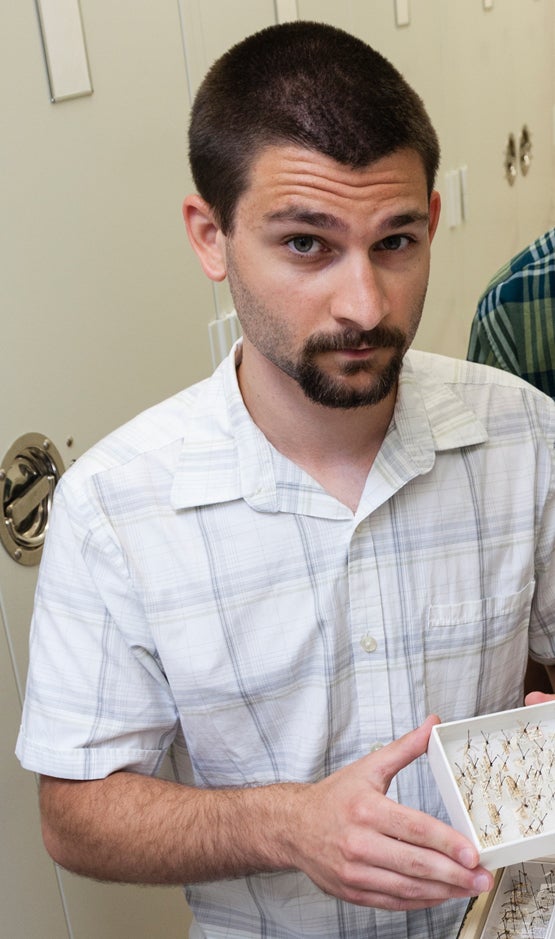CELLULAR SUPERSTAR
ECU undergraduate receives prestigious National Science Foundation fellowship

Chris Cohen is enrolled in an interdisciplinary doctoral program in biological sciences at ECU.
In addition to Joseph Paul, three East Carolina University graduate and doctoral students are also recipients of a National Science Foundation Graduate Research Fellowship, one of the most prestigious fellowships for science, technology, engineering and math or STEM students:
Gina Bledsoe, a graduate student studying molecular biology and biotechnology, advised by Dr. Ariane Peralta;
Chris Cohen, an interdisciplinary doctoral program in biological sciences student, advised by Dr. Michael Brewer;
Jeff Cole, who will attend ECU in the fall as a student in the interdisciplinary doctoral program in biological sciences, also advised by Brewer.
Joseph Paul’s graduation from East Carolina University on May 6 will mark another step in his research career with a move to California.
Paul will attend the University of California, Berkeley to study cell biology at no cost thanks to a National Science Foundation Graduate Research Fellowship.
“This is the most competitive fellowship in American science,” said Dr. Jeff McKinnon, professor and chair of ECU’s Department of Biology. “Only the strongest students even apply, and of those, about 12 percent are successful. It speaks well of Joseph and of the training that we are providing him.”
NSF Fellows are expected to become knowledge experts who can contribute significantly to research, teaching and innovations in science and engineering. These individuals are crucial to maintaining and advancing the nation’s technological infrastructure and national security as well as contributing to the economic well-being of society at large, according to the program’s website.
Since 2013, Paul has been working on genome editing research with ECU biology assistant professor Dr. Yiping Qi. The goal of the work is to bring innovative agricultural tools that will improve crops grown in eastern North Carolina, Paul said.
“Genome editing in plants is an up-and-coming tool that’s being used worldwide in biology, but we’re applying it to the region,” said Paul, who hopes to be a scientist in academia or private industry designing new drugs or biotech tools.
Paul’s interest in research began with a high school summer internship in a laboratory at the Mayo Clinic in Jacksonville, Florida. The internship was such a good fit that Paul was invited back the next two summers as a paid special projects associate.
“I worked on a project that received a lot of attention. It caused a paradigm shift in ALS research,” said Paul, an EC Scholar who will earn a bachelor’s degree in biology. “I was very fortunate. I really liked the science that they were doing.”
Paul’s tenure at the Mayo Clinic led to a connection at Stanford University School of Medicine, where he continued his work with ALS as a visiting researcher for two summers. From this experience, Paul published an article in Science magazine as a junior and Nature Neuroscience as a senior at ECU.
“Most faculty hope to have an article appear in Science at some point in our careers,” said McKinnon. “It’s very unusual to start off a career with that as a junior in college — auspicious to say the least.”

Test tubes await experimentation and further study in an ECU lab.
Now with five years of research experience, notable publications and acceptances to Ivy League doctoral programs, Paul will receive a $102,000 stipend over three years plus a $12,000 allowance for expenses such as fees, professional development and personal research endeavors from the NSF.
“The fellowship is a truly humbling honor,” Paul said. “The award really recognizes my research mentors and the fellows and students who have trained me over the past five or so years. Aside from teaching me the technical skills necessary to be a scientist, they have consistently challenged me to think critically about experiments and have set the best example for being an engaged and generous scientist.”
Since 1952, NSF has funded close to 50,000 graduate research fellowships, which is just 10 percent of their received applications. For the 2016 competition, NSF received close to 17,000 applications, and made 2,000 award offers.
“Joseph is a self-starter and remarkably capable for someone his age,” McKinnon said. “As we mature as a research department, we hope to see more awards like these.”
In addition to UC Berkeley, Paul was admitted to Columbia, Duke, Stanford, the University of California, San Francisco and California Institute of Technology.
“At ECU, I hope this will stimulate a culture of academic excellence by encouraging students seeking graduate education to work towards the NSF Fellowship and other great opportunities, such as Rhodes, Fulbright and Schwartzman,” Paul said.